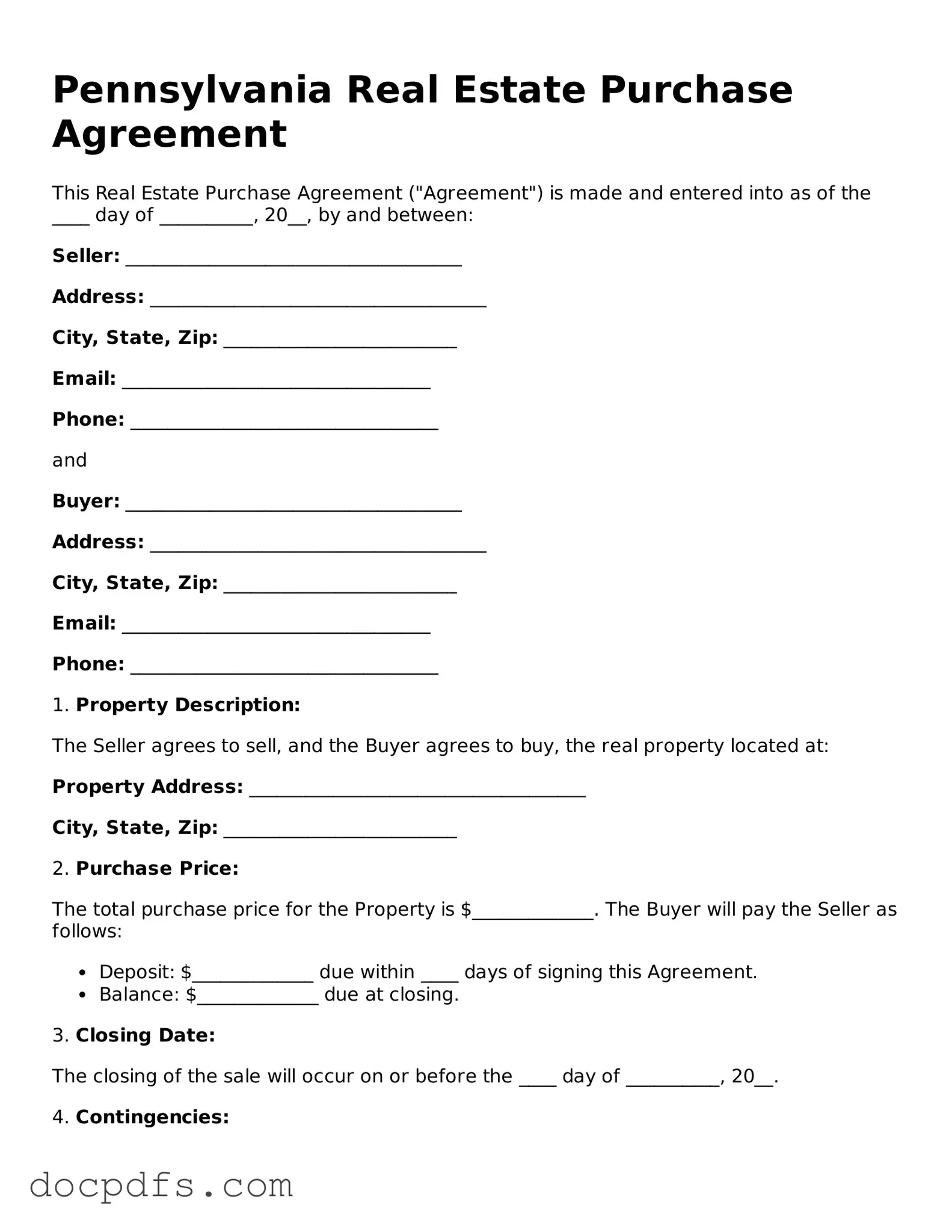What is a Pennsylvania Real Estate Purchase Agreement?
A Pennsylvania Real Estate Purchase Agreement is a legally binding contract between a buyer and a seller. This document outlines the terms and conditions under which the buyer agrees to purchase a property, and the seller agrees to sell it. It serves as a roadmap for the transaction, detailing everything from the purchase price to contingencies and closing dates.
What key elements are included in the agreement?
Several important components are typically found in a Pennsylvania Real Estate Purchase Agreement:
-
Parties Involved:
The names and addresses of both the buyer and seller.
-
Property Description:
A detailed description of the property being sold, including its address and legal description.
-
Purchase Price:
The agreed-upon price for the property.
-
Earnest Money:
A deposit made by the buyer to show commitment to the purchase.
-
Contingencies:
Conditions that must be met for the sale to proceed, such as financing or inspections.
-
Closing Date:
The date when the transaction will be finalized.
Why is earnest money important?
Earnest money acts as a good faith deposit. It demonstrates the buyer's seriousness about purchasing the property. If the buyer backs out without a valid reason, the seller may keep this deposit as compensation for the time the property was off the market. Conversely, if the sale goes through, the earnest money is typically applied to the purchase price at closing.
What are contingencies, and why do they matter?
Contingencies are conditions that must be satisfied for the sale to proceed. Common contingencies include:
-
Financing Contingency:
The buyer must secure a mortgage to complete the purchase.
-
Inspection Contingency:
The buyer has the right to conduct a home inspection and negotiate repairs or credits based on findings.
-
Appraisal Contingency:
The property must appraise for at least the agreed purchase price.
These contingencies protect both parties and ensure that the sale is based on agreed-upon conditions.
How long is the agreement valid?
The validity of a Pennsylvania Real Estate Purchase Agreement typically depends on the terms outlined within the document itself. Generally, the agreement will specify a timeframe for the buyer to fulfill contingencies and for the closing to occur. If these timelines are not met, the agreement may become void unless both parties agree to extend it.
What happens if either party breaches the agreement?
If either party fails to uphold their obligations as outlined in the agreement, it is considered a breach. The non-breaching party may have several options, including:
-
Seeking monetary damages.
-
Requesting specific performance, which means asking the court to enforce the terms of the agreement.
-
Terminating the agreement and pursuing other options.
It’s important to understand these implications before entering into the agreement.
Can the agreement be modified after it is signed?
Yes, the Pennsylvania Real Estate Purchase Agreement can be modified after it is signed, but any changes must be agreed upon by both parties. Modifications should be documented in writing and signed by both the buyer and seller to ensure clarity and enforceability.
Is it advisable to have a real estate attorney review the agreement?
While it is not legally required, having a real estate attorney review the agreement can provide valuable peace of mind. An attorney can help identify potential issues, ensure that your interests are protected, and clarify any legal language that may be confusing. This is especially important for first-time buyers or sellers unfamiliar with real estate transactions.
What should I do if I have questions about the agreement?
If you have questions or concerns about the Pennsylvania Real Estate Purchase Agreement, it’s best to seek advice from a qualified real estate professional or attorney. They can provide guidance tailored to your specific situation, ensuring that you understand your rights and obligations before proceeding with the transaction.

